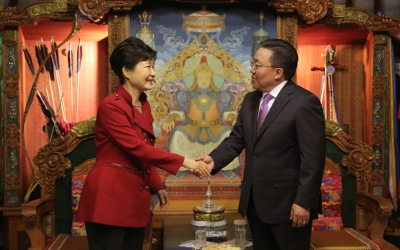AKIPRESS.COM -  South Korea has agreed with Mongolia to pursue a bilateral economic partnership agreement (EPA), a move to expand bilateral economic cooperation and exchanges with the world's 10th largest producer of natural resources, according to Business Korea.
South Korea has agreed with Mongolia to pursue a bilateral economic partnership agreement (EPA), a move to expand bilateral economic cooperation and exchanges with the world's 10th largest producer of natural resources, according to Business Korea.
The possible Korea-Mongolia EPA is Mongolia’s second FTA following the Japan-Mongolia EPA which came into effect last month. The East Asian country initially took a passive attitude toward EPA with South Korea due to negative public sentiment of Japan-Mongolia EPA but it has decided to seek the bilateral EPA in the summit meeting.
The trade volume of the two countries peaked at US$490 million in 2012 from US$2.71 million in 1990 when the two established the diplomatic ties. However, the figure decreased to US$290 million in 2015 due largely to Mongolia's recent economic downturn. At the time when the two countries need to seek ways to expand economic exchanges, the EPA is expected to play a role as a lever. An EPA is similar to a free trade agreement (FTA), seeking free trade of commodities and services. It focuses more on industrial and investment sectors. In fact, an EPA is an institutional framework to bolster mutual cooperation between countries, aiming at a FTA.
For South Korea, the possible EPA is significant in that Mongolia has a high growth potential in the future. As the world's 10th largest producer of natural resources, Mongolia recorded an annual economic growth rate of 13.8 percent between 2011 and 2013 with large-scale mining development projects and investments in infrastructure, but the growth drastically declined after 2014 due to the fall in raw materials prices. According to the International Monetary Fund (IMF), however, Mongolia’s economic growth rate will rise to 5.7 percent in 2018.
Since Mongolia is bordered by China to the south and Russia to the north, it is considered the important spot in Central Asia. Accordingly, Japan has been scrambled to enter the Mongolian market through the government’s support. The Korean government and companies also have been trying to invest in Mongol, but have had difficulties due to the weak institutional framework for economic cooperation.
Mongolia is pushing for a "third neighbor policy" to pursue cooperation diversification with South Korea, Japan and the U.S. in order to get out of its excessive economic dependence on China and Russia.
Once the negotiation begin, the EPA is expected to come into effect in four years. It can be shown with Mongol’s first EPA with Tokyo which went into force in June.
The problem is the issue in the negotiation with interests between the two countries. South Korea and Mongolia are also highly likely to have difficulties in reaching an agreement in tariffs for goods in the agricultural, dairy and industrial sectors to conclude the EPA. In a bid to support joint research between the two countries and commerce capability of Mongol, the Korean government plans to share its experiences in signing FTAs with Mongol.
